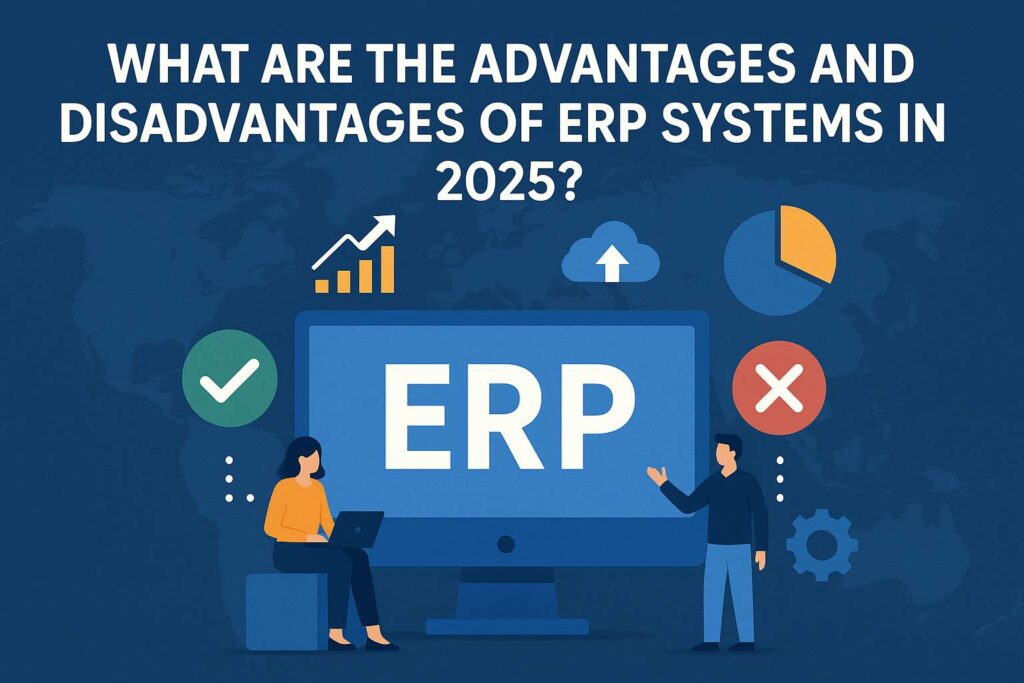What Are the Advantages and Disadvantages of ERP Systems in 2025?
In 2025, digital transformation is no longer optional, and ERP systems have become a key driver of business efficiency and growth. This article explores the advantages and disadvantages of ERP so you can make an informed (and confident) decision for your organization.
Why ERP Matters More Than Ever in 2025
Enterprise Resource Planning (ERP) systems unify your operations into one powerful platform — finance, HR, inventory, sales, CRM, and more — all connected and accessible in real-time.
For modern businesses in the USA, UAE, and beyond, implementing an ERP is not just an upgrade — it’s a competitive advantage.
Major Advantages of ERP Systems
ERP systems offer practical, high-impact benefits that help businesses scale, streamline, and stay ahead.
1. Total Business Visibility in Real Time
ERP brings every department into one shared system, giving you accurate, real-time data across your entire business.
Example: A retail manager in Dubai can see inventory, shipments, and sales performance instantly — no delays, no guesswork.
2. Drastically Improved Efficiency
Automation reduces manual work, speeds up processes, and minimizes costly errors.
- Faster invoicing and payments
- Smooth order fulfillment
- Automatic stock level alerts
It’s like having your entire business on autopilot — smarter, faster, and more responsive.
3. Smarter Decision-Making
With integrated dashboards and reports, leaders can track KPIs, forecast demand, and manage performance easily.
And thanks to AI-powered ERP systems like Odoo, predictive insights are more accurate than ever.
4. Scalable for Every Business Size
Whether you’re a startup or an established enterprise, ERP platforms grow with you. You can start small and expand features as needed.
That’s why many companies trust flexible solutions like Odoo ERP customization to tailor the system to their needs.
5. Seamless Collaboration Across Teams
With everyone working in one unified platform, collaboration becomes seamless, especially for remote or multi-location teams.
6. Compliance and Security Built In
ERP software includes controls for tax compliance, industry regulations, and strong data security, helping you stay protected and audit-ready.
7. Future-Proofing Your Business
In 2025, businesses with modern ERP systems are better prepared for AI integrations, remote work, and customer expectations. It’s a long-term investment with long-term returns.
Are There Any Disadvantages of ERP?
Yes — but they’re small when managed correctly, especially with expert support.
1. Initial Investment
ERP systems require an upfront cost, but it’s important to see this as a long-term ROI, not a one-time expense. With the right ERP implementation services, you avoid waste and ensure value.
2. User Training
Any new system takes time to learn, but modern ERP interfaces are becoming more user-friendly. A little ERP system training can make a huge difference.
3. Customization Needs
Some businesses require specific features. But working with an experienced Odoo development company ensures your ERP fits your exact needs, without overcomplicating things.
4. Change Management
Staff may resist new tools at first, but with strong leadership and proper onboarding, adoption becomes smoother. ERP consulting services can guide your team through this transition with ease.
💡 Important Perspective: These aren’t deal-breakers. They’re small road bumps — and they can be avoided or solved with the right partners and planning.
Recap: ERP System Pros That Matter in 2025
Let’s recap the key ERP system pros and cons 2025 style — the pros far outweigh the cons.
Top ERP Advantages:
- Unified system across departments
- Real-time insights and control
- Reduced manual work and errors
- Faster decisions with better data
- Scalable and customizable
- Improved compliance and security
- Future-ready architecture
Minor Disadvantages (and easy fixes):
- Initial cost → Strategic investment
- Training needs → Solved with onboarding
- Customization complexity → Handled by experts
- Change resistance → Eased with consulting
Final Takeaway: The ROI of ERP Is Too Big to Ignore
When you weigh the advantages and disadvantages of ERP, it’s clear that the benefits are not just helpful — they’re essential in today’s fast-paced business world.
Businesses in industries from retail to manufacturing, healthcare to services, are leveraging ERP to unlock productivity and reduce chaos. With the right support, ERP becomes one of the smartest business decisions you’ll make.
Thinking of implementing ERP in 2025? Start by exploring tailored ERP implementation services, and consider hands-on ERP system training to set your team up for success from day one.

